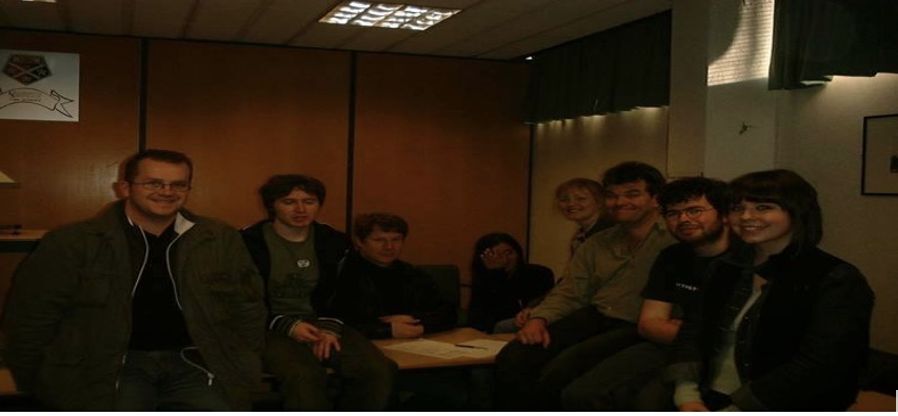By Malcolm Combe
I was an undergraduate law student at Strathclyde from 2001-2005. Whilst I had no idea this would be the case when I enrolled, being a student at this time put me in a fortunate position: I was able to join the first intake of student volunteers at the new-fangled University of Strathclyde Law Clinic.
I confess I had never even heard of a law clinic when Donald Nicolson sought recruits for the initiative he was setting up at Strathclyde. Like many other enthusiastic students though, I took the plunge and got involved. After an initial period as an advisor, I then become Firm Manager of one of the three firms the Clinic was (at the time) divided into. I continued my involvement with pro bono legal advice in various capacities in the years that followed, before eventually returning to Strathclyde Law School as an academic in 2019. That allowed me to rekindle my support of the Law Clinic in a number of ways, and in the past couple of years I have acted as Programme Director of the Clinical LLB: a dedicated programme for students who embed law clinic experiences and insights into a law degree. It seems fitting that I have somehow found my way back to the Law Clinic, and I’m delighted to be able to contribute to this 20th anniversary celebration of it.
One particular memory of the clinic involves Donald and I going to the old BBC studios at Queen Margaret Drive for a radio interview. For which station I cannot recall, and whether this ever made the airwaves I am not sure; I suspect it did not. Somewhere though, there may be an archive tape where I can be heard adopting the word “worthwhile” as my most favourite word ever, and I am only grateful that BBC Sounds wasn’t around to capture this for more public posterity. Anyway, Donald and I tried to speak about why the law clinic was needed, and also how shocking it was that there was such a demand for it given the unmet legal need that was being plugged by students rather than another source of legal advice and support. Maybe we got a bit too political and that is why we were never broadcast. Alas, what we spoke about remains relevant today. I do fundamentally believe in clinical legal education, and it has become part of my practice; whether it should form so much of a societal safety valve is another matter though.
There were plenty of other good memories of my time with the law clinic, particularly in the context of making friends and attending social events. I also have fond memories of making a difference for clients who came in for advice, which leads on to my memory of my most nerve-wracking moment in the clinic…
Prior to 2011, tenancy deposit protection was not a thing in Scots law. Landlords could ask their tenants for a deposit of up to two months’ rent, but what they did with that deposit was not particularly regulated, and in the event of a dispute at the end of the tenancy there was no state-backed scheme available to adjudicate that dispute. Jennifer Wallace and I represented a client who was seeking the return of their deposit, which their landlord was seeking to retain or at least deduct a sum of money from, apparently on the basis of the condition of the let property. We duly trotted to Glasgow Sheriff Court after serving the paperwork in relation to this, only to discover in court that the documents our client had presented to us were not the full story. Cue a massive flap and a hasty oral submission about some point of law that I was absolutely winging. We managed to push matters into a further hearing though, and our client was in the end awarded the full deposit. Incidentally, this case remains my only appearance representing a client in the Scottish court system: I am delighted to note my 100% success rate as a litigator, and the clinic’s contribution to that record.
Being in the Clinic taught me quite a lot, or at least forced me to be more structured in my application of previously abstract ideas. In addition to mundane skills like task management and keeping organised files, the clinic brought notional scenarios to life. Suddenly I was faced with real people with real problems, and I was determined to do my best for them. I hope I did justice to the faith they put in me, and perhaps contributed just a little to the access to justice deficit that existed at the time.
Speaking of which, access to justice issues have not gone away. In fact, they have probably got worse. My message to the current crop of law clinic students is accordingly a simple one – keep striving to make a difference. Also, keep in mind that even if some aspects of your clinic journey might feel a bit hectic or overwhelming when you are in the moment, what you are doing is indeed worthwhile. You are still doing the right thing by putting yourself in those situations. My overwhelming perception of those who have been involved with the clinic is that they look back on their time there with both fondness and an awareness about how it has contributed to their own self-development, not to mention it has allowed lasting friendships to be formed along the way. Here’s to the next twenty years!
